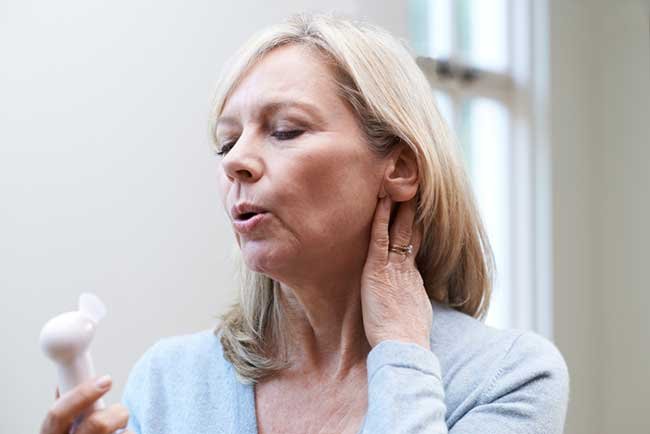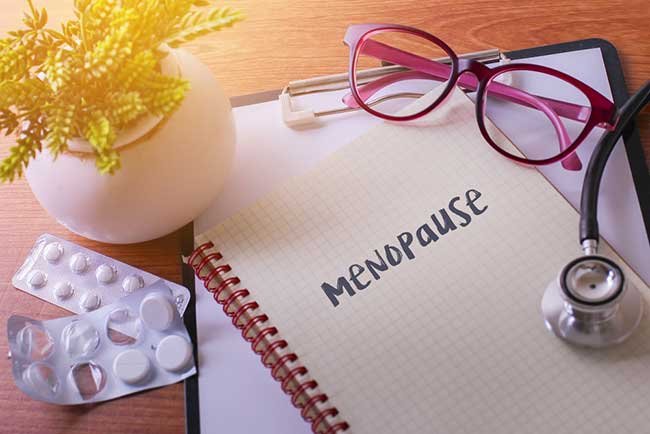
What Is Menopause?
Actually, most of the signs linked with menopause happen in the perimenopause stage.
Some women experience menopause without unpleasant signs or any problem.
But others find menopausal symptoms unbearable, starting even in perimenopause and continue for years.
Menopause symptoms actually happen for lowering the production of female sex hormones like progesterone and estrogen for most women.
Symptoms of menopause vary widely due to the many effects that those two types of hormones have on the female body.

Shutterstock
Read More: 22 Home Remedies to Get Rid of Vaginal Odor Naturally
Estrogen controls the menstrual cycle and impacts the body parts like:
- Brain
- Heart
- Reproductive System
- Bones
- Urinary Tract
- Blood Vessels
- Hair
- Mucous Membranes
- Breasts
- Skin
- Pelvic Muscles
Symptoms of Menopause:

Shutterstock
# Changes in Menstrual Cycle:
Your period may not be as regular as before.
You may bleed lighter or heavier than regular and sometimes spot.
Besides, your period may be longer or shorter in time.
If you miss your period, confirm about pregnancy.
If you’re not pregnant, a missed period could forecast the start of menopause.
If you notice not having your period for 12 subsequent months, confirm to ask your doctor to rule out any severe conditions, like cancer.
Read More: How to Perform Exercise to Lift Sagging Breast at Home
# Hot Flashes:
Some women may experience hot flashes as a primary symptom of menopause.
Hot flashes can be a sudden heat feeling either in the upper part of your body or everywhere.
Your neck and face may become red or may feel sweaty.
The severity of a hot flash can vary from slight to intense.
According to the National Institute on Aging– A hot flash continues typically between 30 seconds to 10 minutes.
Maximum women experience hot flashes for one to two years after the final menstrual period.
Hot flashes may still last after menopause, but they may decrease their intensity over time.
Ask your doctor if hot flashes disturb your life.
They can suggest the right treatment selection for you.
# Vaginal Dryness and Pain with Interaction:
The lower production of progesterone and estrogen can impact the thin layer of moisture that normally covers the vaginal walls.
Women can feel vaginal dryness at any age.
However, it can be a particular difficulty for women experiencing menopause.
Menopause symptoms can include itching or burn to feel about the female genital organ.
Vaginal dryness can occur interactional pain and cause frequent urinate feeling.
To fight dryness, try to use a vaginal moisturizer or a water-based oil.
If you don’t feel well, ask your doctor. Having sex can increase blood flow to that zone.
# Sleeping Problems:
Doctors commonly suggest getting at least eight hours of sleep every night.
But during menopause, it might be tough to fall asleep or stay asleep.
You may get up earlier than normal or have difficulty going back to sleep.
Therefore, try breathing and relaxation techniques by this time. It’s also vital to do exercise.
Try not to keep your laptop or cell phone close to your bed as lights can disturb your sleep.
Bathing, or listening to soft music before going to bed may keep you relax.
Take some simple steps to improve your sleep habits such as go to bed at the same time every night, stay cool while sleeping, and try not to have foods or drinks that alter sleep like caffeine, chocolate, or alcohol.
# Frequent Urination:
Most of the women in menopause commonly cannot control their bladder.
You may also experience a painful or continual urinate feeling even without a full bladder.
This is generally happened due to the vaginal tissues and urethra lose their elasticity.
The nearby pelvic muscles may also weaken.
To combat urinary incontinence, stop having alcohol, stay hydrated, and make stronger your pelvic muscles with Kegel exercises.
If the problems continue, ask your doctor what medicines are offered.
# Urinary Tract Infections:
Some women may experience urinary tract infections (UTIs) during menopause.
Dropping of estrogen and changing in the urinary tract may cause infection.
If you experience a continual urge to urinate or urinating more often, or feel a burning feeling during urinating, ask your doctor.
Your doctor may suggest you have a urine test and give you medications.
# Decreased Libido:
It’s normal to feel less sex attraction during menopause.
This is occurred by physical changes induced by lowered estrogen.
These ranges can include a late clitoral reaction phase, vaginal dryness, and slow or lack of orgasmic response.
But, some women may have more attraction in sex during this time.
If your sex wish is lessened linked to another difficulty, for example, painful sex, ask your doctor.
He or She may suggest medicine to stop the pain.
Read More: 11 Main Causes for Vaginal Odor: Every Woman Should Know to Avoid These Vaginal Odor Causes
# Vaginal Atrophy:
Vaginal atrophy is a type of disorder that happened for lowering estrogen production and is considered by the inflammation and thinning of the vaginal walls.
The can make sexual interaction painful for women, which can decrease their sexual interest.
Over-the-counter lubricants or suggested medications, for example, a vaginal ring or an estrogen cream can cure this condition.
# Depression and Mood Swings:
Hormonal changes can affect moods during menopause.
Some women may experience depression, irritability, and mood swings.
It’s vital to remember that these hormone instabilities affect your brain.
# Hair, Skin, And Other Tissue Changes:
With your age, you will feel changes in your hair and skin.
Loss of scleroprotein and fatty tissue will make your hair and skin thinner and drier.
The lower level of estrogen may occur to hair loss or cause your hair to feel weak and dull.
Confirm not to use harsh chemical hair treatments, which can happen more hair damage.
Read More: Hair Loss Remedy at Home: Best Usage of Black Gram Flour for Hair
When to See a Doctor?
Symptoms of menopause can continue for months or years depending upon the person.
Make regular appointments with your doctor so that they can observe your health condition.
What is your opinion after reading this article about the Symptoms of Menopause at 40? Please leave your comments below-








